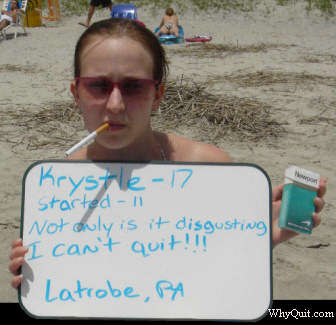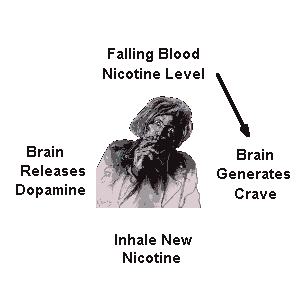
"Why can't I quit smoking?"
John R. Polito March 23, 2008
 "I want to quit smoking." "I've tried nearly everything." "Why can't I quit?"
"I want to quit smoking." "I've tried nearly everything." "Why can't I quit?"
If this sounds like you, you're just one step from success but it's a step most smokers miss, a missed realization that contributes to their downfall. It's that knowledge and understanding truly is a quitting method, the empowering self-admission that very few smokers have any insight into nicotine dependency and even less into arresting it.
For example, the "Law of Addiction" is the most important quitting lesson of all. Just one puff of nicotine will result in up to 50% of nicotinic-type brain acetylcholine receptors being occupied by nicotine, creating a powerful dopamine explosion that the mind's pay attention pathways will, in the short term, make nearly impossible to forget. When quitting the quitter isn't battling an entire pack or even a whole cigarette but just that one powerful puff of nicotine that will destroy their hard work and all but guarantee relapse.
Although critical, it's just one lesson among many. How long does it take to reach peak withdrawal, why can getting there feel like an emotional train wreck, how does nicotine feed smokers stored fats and sugars with each puff, what happens if they try skipping meals once nicotine feedings end, and how does nicotine interact with stress, caffeine or alcohol?
Imagine trying to quit smoking without knowing the ABCs of quitting smoking. As silly as that may sound, it is far more common than you think.
Think about it, what learning takes place by slapping on a nicotine patch, chewing nicotine gum, swallowing a pill or being hypnotized? None, absolutely none. The smoker knows no more about their chemical dependency after relapse than before.
Why fight in darkness and fear when you can turn on the lights?
 Nicotine dependency is about the mind's "aaah" wanting relif and anxiety punishment pathways being fooled into believing that that next nicotine fix is every bit as real and important as eating. Like trying to go without food, a region of the brain known as the insulapunishes the smoker with urges, craves and anxieties when they go too long without introducing a new supply of nicotine into the bloodstream. As with eating, the brain's dopamine pathways provide them with an "aaah" wanting relief sensation following nicotine replenishment.
Nicotine dependency is about the mind's "aaah" wanting relif and anxiety punishment pathways being fooled into believing that that next nicotine fix is every bit as real and important as eating. Like trying to go without food, a region of the brain known as the insulapunishes the smoker with urges, craves and anxieties when they go too long without introducing a new supply of nicotine into the bloodstream. As with eating, the brain's dopamine pathways provide them with an "aaah" wanting relief sensation following nicotine replenishment.
Welcome inside the nicotine addict's mind, a place where an endless cycle of chemical beatings and relief from them left us totally yet falsely convinced that nicotine defined who we were, gave us our edge, helped us cope and that life without it would be horrible. Our dependency quickly destroyed all pre-addiction memory of the beauty of going days, weeks and months without once wanting for nicotine. Blinded by anxiety beatings, we could no longer see the beauty beyond.
Those selling quit smoking products actually play and prey upon the nicotine addict's wanting and fears. Their marketing is designed to try and get smokers to believe two falsehoods. They need for you to believe that quitting cold turkey is nearly impossible, to fear your natural quitting instincts. They also want them to believe that most who buy and use their products succeed. Both representations are false.
Far from quitting cold turkey being nearly impossible, as suggested by a July 2013 Gallup Poll, more smokers quit smoking cold turkey each year than by all other methods combined. It found that only a tiny fraction of successful ex-smokers used approved quitting products, just 8 percent. But don't believe this Gallup Poll or the U.S. Surgeon General. Instead, take your own poll.
What GlaxoSmithKline, Pfizer and Johnson & Johnson do not want known is how utterly horrible their quitting products work in real-world use -- outside of clinical trials.
Research by GlaxoSmithKline consultants published in 2003 found that only 7% of real-world nicotine patch and gum users were still not smoking at 6 months, a 93% failure rate. Pfizer research suggests that Chantix and Champix will likely produce real-world failure rates frighteningly close to those of the nicotine patch and gum.
Instead of being afraid of your natural instincts why not educate them? Why allow anxieties born of needless fears to eat away at your dreams, desires and resolve? Your natural instincts know that knowledge and understanding can destroy fear, but are you listening? Allow them to explore WhyQuit, the Internet's oldest and most popular nicotine dependency recovery education forum. Nearly 500 free video lessons, two free quitting books (Never Take Another Puff and Freedom from Nicotine - The Journey Home), and Turkeyville a 13,000+ member cold turkey support group, each staffed entirely by volunteers, with WhyQuit declining all offers of donations.

